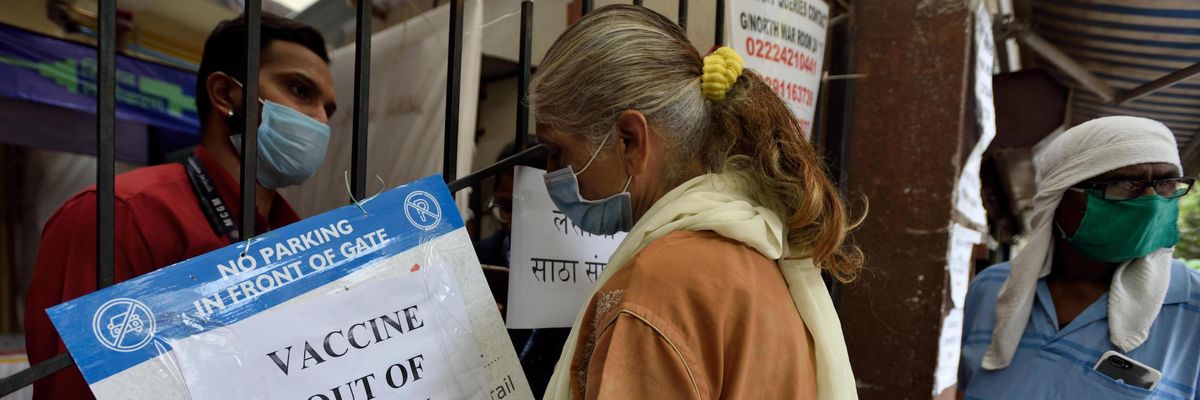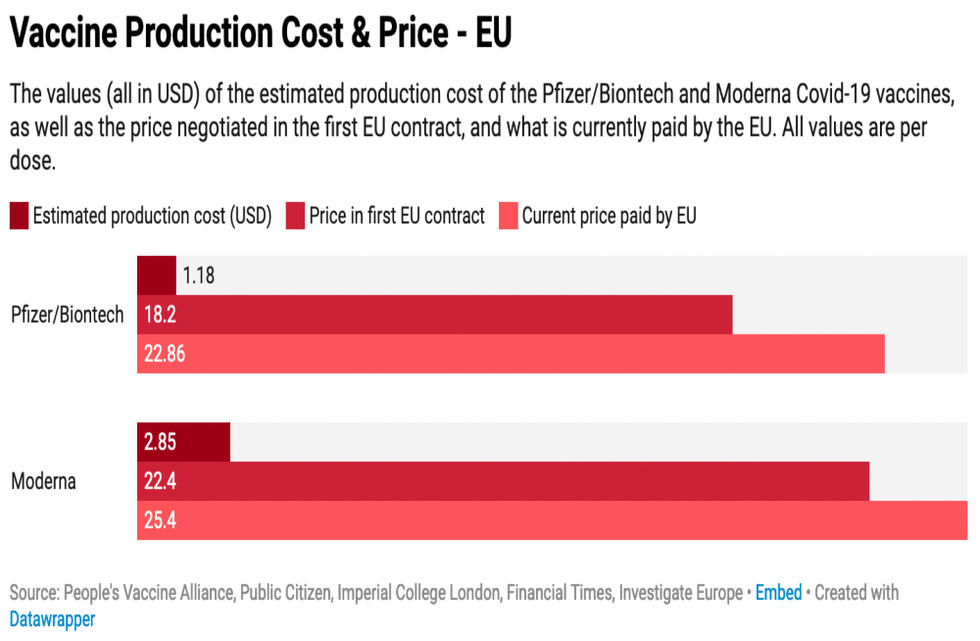An investigative media outlet's probe of closed-door negotiations between European officials and pharmaceutical companies indicates that ensuring equitable, universal access to coronavirus vaccines worldwide was never a top priority of the talks, despite political leaders' repeated claims to the contrary.
After speaking with current and former negotiators, United Nations representatives, NGO officials, and politicians, Investigate Europereported Thursday that "access for all was never a priority" in initial vaccine procurement talks, which set the stage for the present inoculation gap between rich and poor countries. Of the more than 6 billion coronavirus vaccine doses that have been administered globally to date, just 2.2% have gone to people in low-income nations.
"The words 'global public goods' are an empty shell," said one unnamed negotiator, referring to a phrase that some of Europe's top political leaders--including French President Emmanuel Macron and German Chancellor Angela Merkel--used in the early stages of the pandemic to characterize their approach to vaccine production and distribution.
Another negotiator told the outlet that "there was strong nationalism on the European level," a stance that has fueled major European countries' opposition to a proposed patent waiver for Covid-19 vaccines. Pharmaceutical companies in Europe have lobbied aggressively against the patent waiver, which would endanger the drug industry's monopoly control over vaccine production.
Instead of supporting a temporary suspension of patent protections, European Union leaders have provided funding to COVAX and pledged to donate hundreds of millions of excess doses to low-income countries--efforts that have not yet made much of a dent in global vaccine inequities.
The People's Vaccine Alliance, a global coalition of more than 70 humanitarian and public health organizations, tweeted Thursday that Investigate Europe's story "details what we suspected all along."
"Vaccine nationalism and pharma profits trumped Covid solidarity," the coalition wrote.
Investigate Europe found over the course of its probe that secretive negotiations between largely anonymous European negotiators and vaccine makers allowed "Pfizer/Biontech and Moderna to increase the bill for European taxpayers" and ensure that any effort to treat vaccines as a global public good was "shelved" early on.
"What's more, deals have long remained secret, despite EUR3 billion of so-called Advanced Purchase Agreements to secure orders and de-risk production for drugmakers," the outlet reported, noting that contract-related documents that have been released thus far have been so heavily redacted as to be meaningless.
Moderna, Pfizer, and the latter's German partner BioNTech "have reaped over $60 billion in jab sales in 2021 and 2022," Investigate Europe observed. The pharmaceutical giants have sold much of their vaccine supply to rich countries; Moderna hasn't delivered a single vaccine dose to a low-income nation thus far, according to an Amnesty International report published earlier this week.
"Documents seen by the Financial Timesrevealed that Pfizer's vaccine now fetches EUR19.50 against EUR15.50 previously," the outlet noted. "Similarly, a dose of Moderna costs $25.50 (EUR21.60), up from $22.50 in the first deal, although down from $28.50 in the second."
Such price hikes came despite a September 2020 promise from the E.U. Commission's top vaccine negotiator, Sandra Gallina, that vaccine doses would cost European governments between EUR5 and EUR15.
Negotiators claimed in interviews with Investigate Europe that "their hands were tied" in price talks with pharmaceutical companies because of the "lucrative contracts already signed by the United States."
"[Former U.S. President Donald] Trump set up a market based on secrecy and high prices," said one of the negotiators. Another said that "Big Pharma are very good at pressuring."
"If you don't sign their contracts," the unnamed negotiator said, "others will do."
Anna Marriott, policy lead for the People's Vaccine Alliance, told Investigate Europe that "vaccine corporations have been greedy," effectively getting taxpayers to pay for vaccines three times over.
"First with billions for research, then with bloated prices draining public funds, and finally because they're paying little in taxes," said Marriott.


